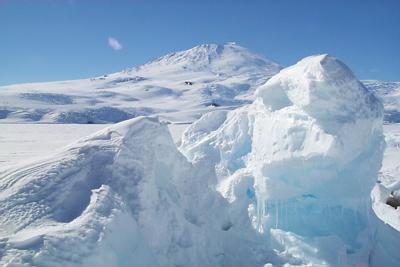1 January, 2000
Hey, its a new millenium and we're all still here !
I have started to settle into daily life here at McMurdo. It is a little
strange never having the finality of darkness at the end of the day. One
day just blends into the next. Yesterday I was hiking around until after
11 pm. It was nice hiking then because earlier in the day it was
overcast; by 10 pm the sun broke through the clouds and illuminated the
surrounding sea ice and glaciers. Good thing I had my sunglasses and
sunscreen for a midnight hike !
Today I saw my first penguins. They were the little Adelies which are
the focus of our project. They just walked in over the sea ice which
still covers the bay. They had to walk several miles, and for no
apparent reason. Perhaps they came to watch humans with cameras. After
walking here, they just lay around on the ice all day and sun bathe,
totally oblivious to people.
The facilities here are amazing. The science labs are extensive and
everything is state of the art. I have total access to new computers and
the government network. We have an office and a lab. I have been working
with one of the PI's (principle investigators) of the Adelie project .
Her name is Lisa Ballance. She is an expert on using a method called
doubly labeled water (DLW). We inject some of the penguins with this
special water that is made up of oxygen 18 isotopes and hydrogen 2
(deuterium) isotopes. When the bird goes out to forage for food, its
metabolism uses this water for respiration. The amount of the DLW that
is used is proportional to the bird's CO2 production and therefore, the
amount of energy used on an excursion.
Using this technique, we can measure the energy expenditure necessary
for the penguin to go get food for its young. This is important
when trying to understand what factors regulate the population of a
penguin colony. If it takes too much energy for the penguins to go out
and get food, they will have nothing left to feed the chicks,
causing the nest to fail. On a large scale, the whole colony could fail
if nearby food is limited. The variable which affects the availability
of food is the amount of ice nearby. Penguin food species are hard to
come by in open water, so if all the ice melts at the wrong time,
parents have to travel much farther for food. This commute distance is
not good if you have a hungry nest of little penguins!

Mount Erebus is one of two major volcanoes on Ross Island.
Contact the TEA in the field at
.
If you cannot connect through your browser, copy the
TEA's e-mail address in the "To:" line of
your favorite e-mail package.
|
